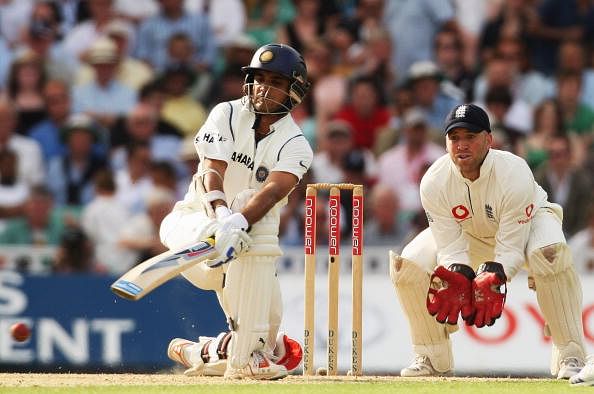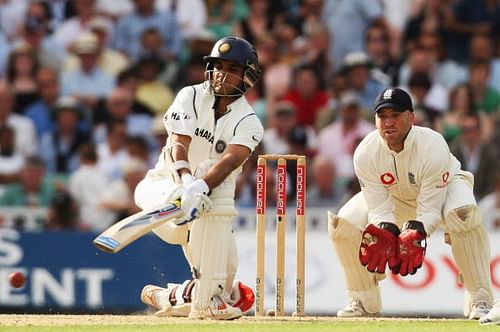
Cricket: from the pavilion back to the pavilion

A prologue precedes it, an epilogue succeeds it and in between them, a novel is written. Feelings and emotions are expressed in between words and thoughts are spoken in the white spaces between the black alphabets. Quite similarly, a cricketer’s life story too is trapped between boundaries. The biography of a cricketer is scripted in between the boundary rope – in the greenish circle, within the dusty 22 yards rectangle.
The soldier leaves his tent and walks out into the middle. His predecessor has fallen and the duty now rests on his shoulders to carry out the unfulfilled task. His stride confident, he caresses the dusty surface with his boots. He surveys the battlefield through the spaces between the grills of his headgear. His enemies snarl at him, their expressions speak the unspoken. Eleven to one, the warrior whispers rhetorically. The man with folded hands stares at him for approval. He gives a nod. The enemy rushes towards him. He can feel the upsurge in his adrenaline. Jaws clenched, he concentrates on the red cherry – the only thing in this world that will make him or break him.
The spherical object rushes at him at a breakneck speed. It shovels up the dust few millimeters away from his left foot. He gets his foot out of the way and attempts to take down his weapon as fast as possible. Alas! He is a millisecond too late. The sphere has run through his defence, rattled his castle and is now mocking him with a bleeding smile. He feels the object grow red with his own blood. He looks around him. His adversaries are jubilant; his own friend is facing away. Distraught and disappointed, he begins the long stride back to his porch. He knows none will sympathize with him; none will extend their supportive hand and tell him not to worry; none will give a pat on his back. The entire world is scoffing at him; he is their latest joke.
The warrior felt betrayed as he managed a seat; his eyes were moist. It was only a month back, he recalled, that the same crowd had lauded him for winning the battle almost single-handedly. His mind drifted through the myriad of incidents, his past feats, his achievements that had earned him the label of the next Commander-in-Chief. Every single day at the battlefield wasn’t the same, he knew it. And he had been prepared to face tough times ever since he had first experienced happier ones. Whenever success had come his way, he had remained grounded, knowing fully well that failure was on line. He was an experienced campaigner now, and he was aware of the odds and the evens. Yet, today he felt deceived – cheated by destiny. As he stared into his own reflection on the glass, he realized the truth – cricket is merciless.
Former Indian skipper Sourav Ganguly holds the finest records for India in the World Cups. Other than the classic array of masterful strokes in his backpack, it had been his no-nonsense arrogance, in-the-face attitude, fearless outlook and fiery aggression that had elevated him to captaincy, and by virtue of which he had established his team as a force to reckon with in the international arena. Strangely enough, it was these same qualities that boomeranged against him and got him dropped from the national team in the Greg Chappell era. Failures had turned the cards in favor of his critics, who had appeared desperately oblivious of his triumphs, and who now clamoured for his exit. Public memory is short, and Sourav was no exception to the list of unfortunate souls battered by circumstances.
Success and failures are imposters all the same. A cricketer understands that well enough. But the fans don’t. Awed by his conquests, they’d place him right above their heads, shower petals on him at the airport, paint their faces with his name, and the very next day, they’d hurl expletives at him and burn his effigies. To the devotees of the game, cricket is no less than a religion, and cricketers expected to be no less than deities. Thus, when deities fall from grace, disciples are quite naturally irked. The Holy Men can never fail; success must always lick their feet. Variation is too mortal, gods are ordained to be consistent.
A cricketer discovers the reality soon after he indulges in the game. It’s the runs he scored or the wickets he scalped that matter. No matter how long he had toiled in the heat, stayed at the crease or run to the bowling crease, it’s only his stats that will speak at the end of the day.
“Figures often beguile me,” Mark Twain had written, “particularly when I have the arranging of them myself; in which case the remark attributed to Disraeli would often apply with justice and force: ‘There are three kinds of lies: lies, damned lies, and statistics.’”
Ironically, however, the gentleman’s game doesn’t afford as much magnanimity, and neither does its aficionados. Being a cricketer is as much burden as it is a boon. Notwithstanding one’s style, technique and grace, it ultimately converges into the suffocating numerical world of statistics. His exploits within the 22 yards goes into the records, quantizes him as a cricketer and rates his greatness. At the end, it all comes down to the greens; the on-field drama is what matters.
A walk from the pavilion back to the pavilion – in between, a cricketer is built.